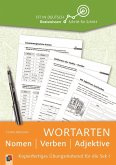Some remain undiscovered or misunderstood, others underappreciated and underchallenged. That is for some highly gifted children the reality of everyday life in preschool or school. How can we help highly gifted children and adolescents to develop more self-assurance, to discover their hidden talents and to become strong personalities? How can teachers, parents and caretakers alike recognize the highly gifted at an early stage? How can they accompany them on their path, providing both the necessary care and challenges along the way? This book provides many case examples of how this matter can be approached in the real world and suggests a number of methods for furthering highly gifted children and adolescents, whether in preschool, in school settings or in the family. The authors are experts in this field and have many years of experience working with gifted persons in various educational institutions. This volume provides practical help for practical situations!
Bitte wählen Sie Ihr Anliegen aus.
Rechnungen
Retourenschein anfordern
Bestellstatus
Storno









